So you’re considering an edible garden this year. Learning how to grow what you eat can be a liberating experience. The act of creating one of life’s most sustaining elements, food, encourages more than just planting a seed. Growing what you eat encourages a healthy body, mind, and spirit.
This post may contain affiliate links at no additional cost to you. By making your purchases through the links on this website, IMSL may make a small percentage at no direct cost to you. IMSL only promotes products we use & truly believe in. Please refer to my Privacy & Disclosures for further information. IMSL thanks you for your support!
Recent shifts in how we live and approach our daily lives have many thinking of becoming more food reliant. Self-reliant that is. Depending a bit less on the local grocer and a bit more on ourselves.
Easier said than done for many. Is it possible to become self-reliant with food? How does one begin? What skillsets do I need to accomplish the task of providing or supplementing our own food? Do I have to have a “green thumb”? And more importantly, why is growing what we eat so important anyway?
GROW WHAT YOU EAT BENEFITS
It may be easier to ask what are the negatives about growing what you eat 🙂 There are so many benefits that would be an article all it’s own (and may well be), but let’s attempt at describing a few.
For us here at IMSL, first and foremost, it’s the number one reason we began our homesteading journey. To become more self-sustaining and self-reliant.
Thinking you can’t become your own producer of food because of where you live? Think again and check out our article, “Homesteading – What Is It”. Anyone can create their own food in some manner. So what are some other benefits? Here you go.
The food! Fresh, crisp, straight from the garden. There may be no healthier food on this earth than that of freshly harvested organic produce! You can have complete control over how your food is produced; organically, with reduced chemical usage & less of a carbon footprint!
For the health of it! Growing your own food may be the best exercise for not only your body but for the mind & spirit you will ever do! In an article published in the Harvard Health written by Heidi Godman, growing what you eat has many benefits.
Growing your own food has many health benefits:
It helps you eat more fresh fruits and vegetables.
You decide what kinds of fertilizers and pesticides come in contact with your food.
It lets you control when to harvest your food. Vegetables that ripen in the garden have more nutrients than some store-bought vegetables that must be picked early.
Heidi Godman
Growing your own food creates a strong sense of satisfaction, of garden to table pride. The enjoyment of gardening reduces stress levels, dirt can make you happy as studies suggest, creates food availability in your pantry, and thus creates your own personal food security.
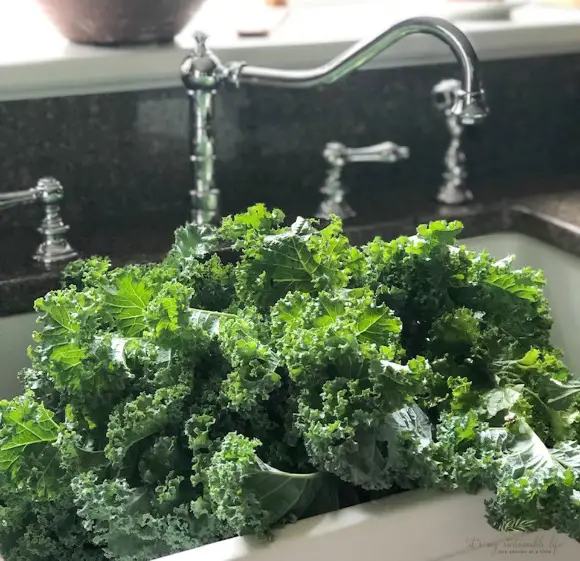
Where do you begin to figure out the steps to take to be able to eat what you grow? Steps being the keyword. Take it one step at a time.
DETERMINING WHAT YOU EAT
Determining exactly what you like to eat is the first step. How? Go through your favorite dishes that you and your family enjoy eating!
Be realistic here. Keep it simple. Know that there are no processed food options here 🙂 Only fresh, healthy produce.
Begin making a list of the common ingredients used in those favorite dishes. Ingredients such as these are typically on everyone’s list…
- Onions
- Potatoes
- Carrots
- Celery
- Tomatoes
- Garlic
- Herbs
Surely there is more on your list, but this gives you an idea. Next, determine if these items can be grown in your gardening zone. If you don’t already know your zone you can determine yours HERE.
GROW WHAT YOU EAT
Talk with any successful gardener and they will tell you it’s all in the planning. It’s about first determing your gardening style or method, then figuring out what you will grow & maybe educating yourself on reading & understanding those seed packets prior to purcashing your seed.
Once you have that determined, you may need to start plants from seed to get ahead start on the growing season. No excuses here! It’s not difficult and anyone can accomplish this. Remember, no one ever succeeds in anything without a little failure, garden failure that is 🙂
HOW TO GROW & RAISE YOUR OWN FOOD {THAT YOU’LL ACTUALLY EAT}
Seed catalogs & displays are made to be enticing. Look at all those exotic options. The brightly colored, mouth-watering choices!
Don’t be so enthralled with the possibilities that you overextend your purchasing! It’s easy to do, trust us! Keep it simple, especially when first beginning. You can always expand & discover new options as you go.
Think kitchen garden or salad garden when first beginning. Why grow fava beans when you have no idea how to prepare & enjoy them? Keep it simple!
EAT WHAT YOU GROW
By growing the foods you use and love you are assured plenty of healthy, fresh produce when in season. Be flexible. Learning that the rythyms of your garden don’t always remain in alignment with your meal planning means you need to be flexible with what you put on your table & when.
Ripening for harvest doesn’t all happen at once & learning to cook according to our garden’s timeline is the best advice we can give.
If you need some inspiration in the kitchen, we recommend looking to “The Creative Kitchen”. Stephanie’s approach to cooking organically and what is in season will have you inspired to becoming creative in your own garden to table efforts!
Eating seasonally provides the highest nutrient dense foods are available to you & your family. But what about the rest of the year?
LEARN TO PRESERVE
Once you have grown on your favorites learn how to preserve them to enjoy the rest of the year! Learn to can, it’s not hard (you can learn easily with our FREE EBook, “A Beginner’s Guide To Canning”, simply scroll to the right and subscribe for your copy) and it’s one of the best ways to preserve summer’s bounty.
Create a cold space or cold cellar to store root vegetables (potatoes, onions, garlic, & carrots) for fresh eating all winter. Have freezer space? Learn to freeze some of your favorites (string beans, squash etc). Grow herbs? Dry your herbs or dehydrate them for long-term storage.
These are just some ideas of how to preserve your bounty. You can find more options and suggestions on our “preserve and prepare” section on our blog.
GROW INDOOR CROPS
Growing indoor crops such as fast growing microgreens or countertop kitchen & herb gardens are now easily done and accessible. These fast & easy to grow crops can offer highly nutritious foods & supplement your families diets during the colder months.
CAN YOU GROW ENOUGH FOR YOU & YOUR FAMILY?
Possibly. There are many factors that need to be considered when trying to determine if you can grow enough for yourself & your family.
What do you eat? Do you eat primarily vegetables or a mix of vegetables & proteins? Determining your eating habits will determine whether you can grow your own entirely or not. Begin at the beginning & start with that list you made of your favorite dishes.
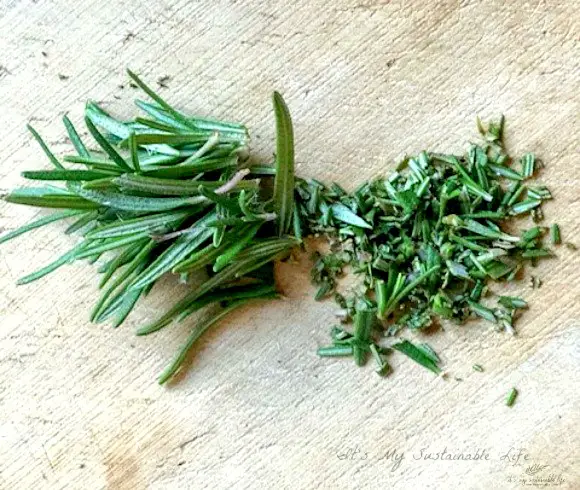
Go through that list & research thoroughly the growing requirements of what it is you wish to grow. Spacing, time, light, & water needs all need to be taken in to consideration.
Where do you live? Some may be able to eat almost year round from their garden if they live in warmer climates. Others who have stronger seasonal shifts may be looking for an onion come spring if they didn’t calculate correctly when planting, or maybe even not be able to grow that crop in their zone.
How much gardening space do you have access to? If you are living in an urban center and have access only to a balcony, growing large rambling crops like summer squash is not really in the cards for you. It may be that what you grow is supplemental only.
What kind of food storage do you have access to? Can you create a cold room or have a large freezer available? Again, these issues may determine how much or little you can supplement your families food needs throughout the year.
How many will you be growing for? When planning your garden, determine the number of plants required for your family size. Below find some estimates of the number of plants required to fill a family of four’s needs for one full year. These are guidelines only. Obviously, adjust according to your needs.
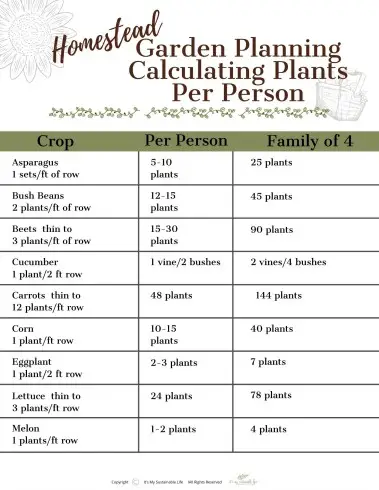
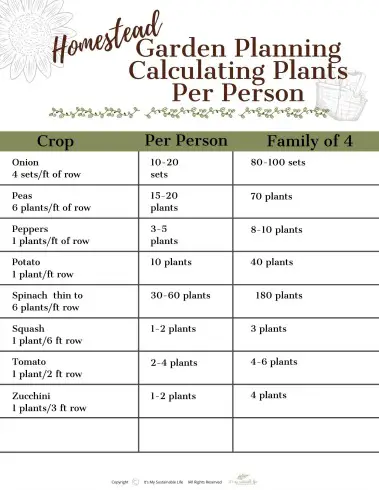
Again, these are only estimations and can easily be adjusted to family size and needs. Practice over the years will be your best teacher as to what suits your family best. For instance, here on the hill we use a LOT of tomatoes.
We put up (can, freeze, & preserve) many tomato products. We can approximately 85 quarts of whole tomatoes each year alone to meet our needs. This does not include salsa, tomato soup, & tomato sauce thats canned & prepared. Therefore, the tomato plant estimation above does not come close to meeting our families needs.
This year I have approximately 150 tomato plants growing in the house. Yes, my house is now our greenhouse 🙂
QUICKEST FOODS TO GROW
Some of the easiest crops to grow are also some of the quickest to grow and enjoy. The following list are our favorites to grow, many from sow date to harvest in as little as 7 to 21 days.
- Microgreens
- Spinach
- Green onions
- Arugula
- Baby carrots
- Lettuce
- Radish
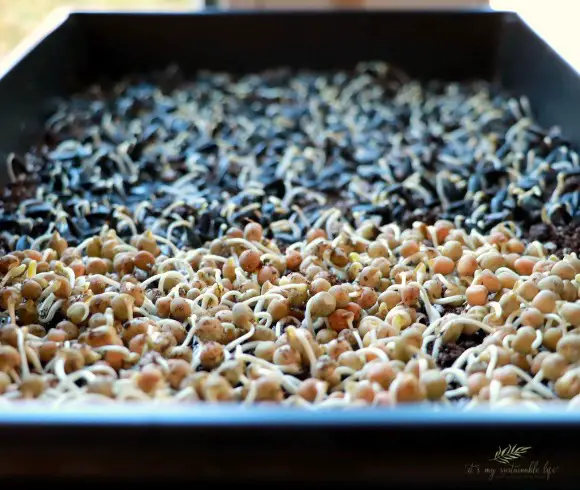
Just think in 7-21 days you could have wonderful additions to stir-fries, salads, pad thai, and so much more!
WHY GROWING YOUR OWN IS IMPORTANT
Why is growing your own food important? Well, all of the above! Creating self-reliance for one of the most important life sustaining requirements, food, may be the most important skill one can learn at the present time.
The fact that you are not only becoming more self-reliant, but also may be improving the health of yourself as well as that of your family, saving money, and enjoying the fruits of your labor throughout the year, may be the only inspiration one needs to grow what you eat.
Oh, and did we mention the taste? YUM!
What are you planning to plant this year? Join our conversation below, we love to chat!
Love, Light, & Laughter ~

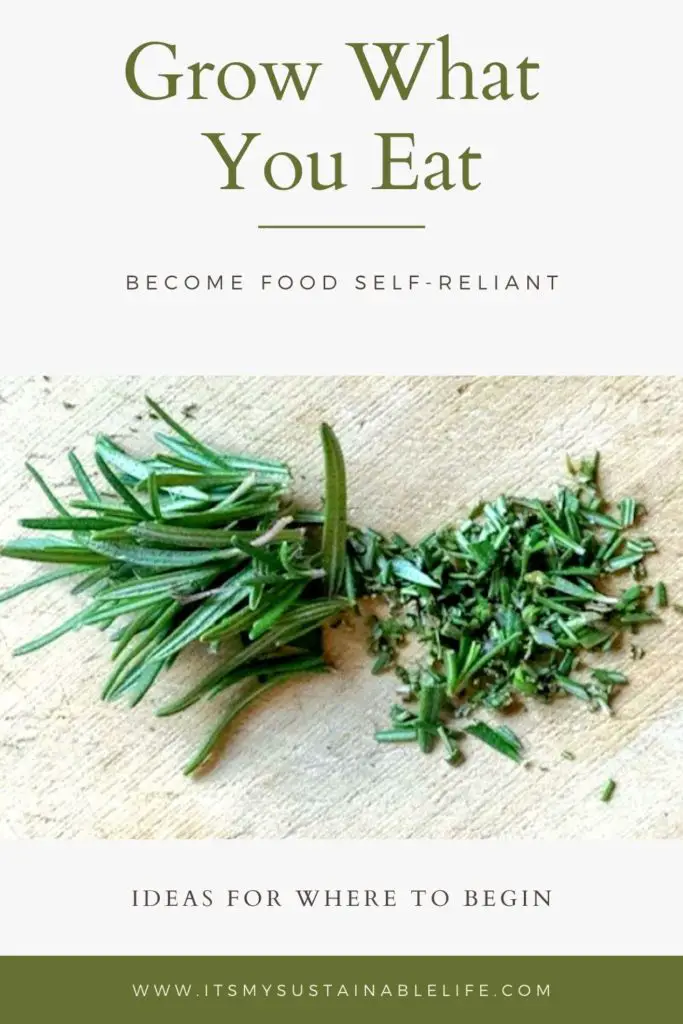
This article was featured at the Homestead Blog Hop!
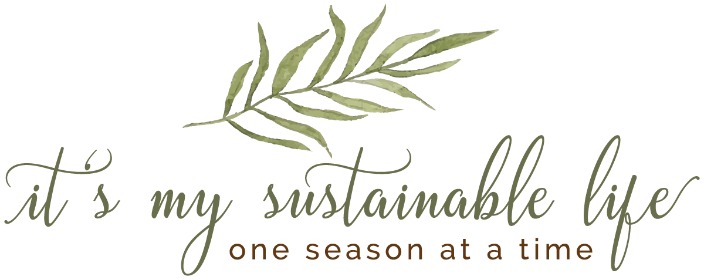
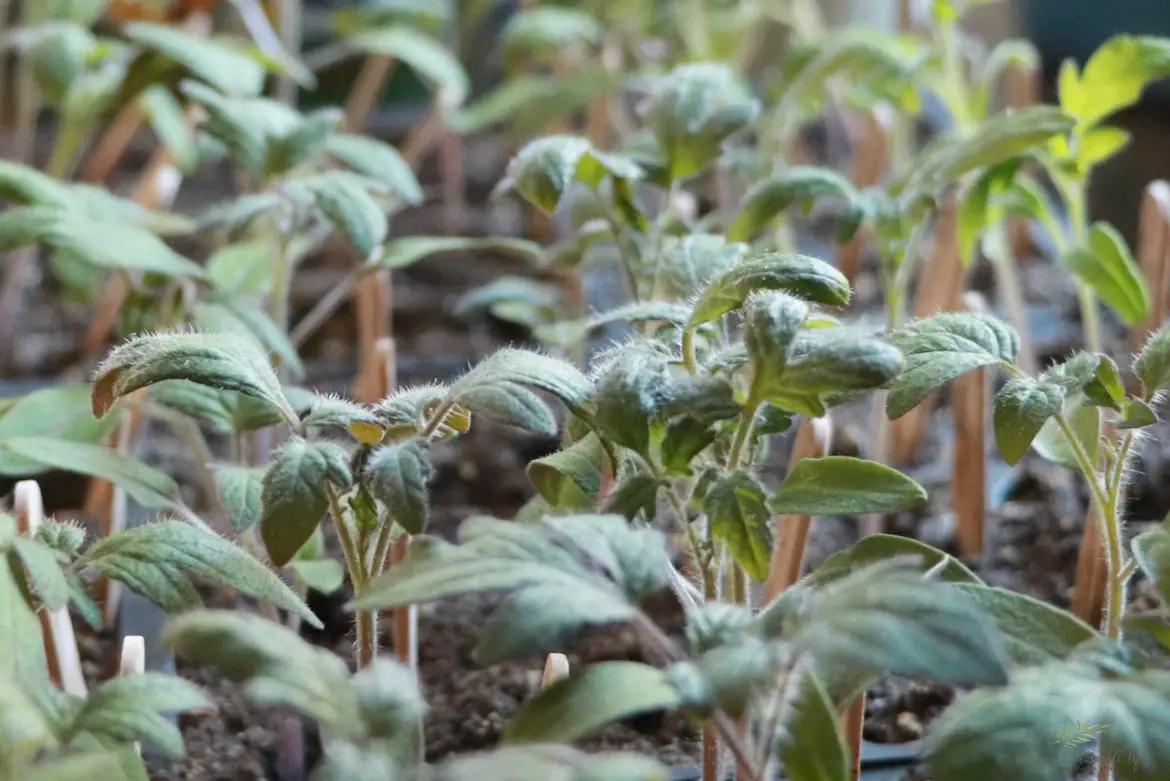
34 comments
What a great article — full of detailed information. Here in coastal South Georgia, my husband is getting ready to plant early spring vegetables in his raised bed garden. I’m looking forward to delicious, homegrown veggies.
Carol
I’m getting my garden ready now. I won’t be able to play anything until the end of May. Great tips and I live the chart!!
Thank you, Pauline! Glad you enjoyed the read!
Excellent tips! I enjoy a small veggie garden and a large herb and flower one. I know I can’t raise all of my food but I enjoy what I do grow. It’s so satisfying!
This is such a wonderful post, Suzan! You’ve shared such good, practical advice and plans. Growing our own food is so rewarding, and I think more and more people are considering it in light of everything that is going on. Thank you so much for sharing, and for being a part of the Hearth and Soul Link Party community. I’m featuring your post at the party this week. Happy Easter!
Great information full of details. Our family worked in our garden today. From a distance of course : ) It was nice to be outside.
We grow a lot here in California but I need to get better at preserving!
I can’t wait to get my garden started. Yesterday I teed up my portable green house.
Great detail… love it! I can’t wait to grow our own microgreens.
Your posts always have so much information! I love the idea of growing our food. Im looking forward to reading more and getting ideas for my future garden.
Great information. I have never seen a chart that explained how many plants feed X amount of people. Thank you!
Now is the perfect time to learn to be more self sufficient.
I’ve always wanted to try to garden! Thanks for your informative posts!
Great resource! I love how you break out how much to grow for your family’s needs. We have definitely gone both ways with under-planting and over-planting certain crops.
Thank you for this great reminder that gardening season is fast approaching! I love growing veggies and knowing they are pesticide free and fresh from the garden!
I’d love to grow onions and potatoes but don’t know where to start!
Keep an eye out for upcoming posts on both! If you have any specific questions, please feel free to reach out to me. Happy planting!
I have really been enjoying your posts on gardening. I am looking forward to warmer weather so I can start planting.
Your fresh kale greens look amazing! I missed my garden last year – I need to make it a priority this year!
I love the guide on how many plants per person. Super helpful!
I love growing what I eat and eating what I grow. There is a lot of satisfaction in it. And you get outside more.
We always had a big garden but we lack the room for it now. My husband grows tomatoes and onions along the side of the house, and we always enjoy the fresh vegetables that we get from the farmers’ markets or from friends. Nothing compares to vegetables fresh from the garden!
Love your posts about gardening. My family has the land to do some major gardening and I am always impressed at their produce. And you are correct, healthier and tastes so much fresher and stronger in flavor. Thanks for your information.
I can’t wait to get back into my garden when the weather improves. I really love the calculating plants chart!
Thank you Casandra! I appreciate the read & you stopping by.
It’s a long time since we had a garden. After the dog arrived, there was nothing left of it. He ate the strawberries and the plant all the way to the ground. We’ve got a few herbs now.
Well, hopefully he is a bit older now and maybe not so curious 🙂
Because of our crazy weather in the Midwest and the fact that we have clay for soil, we have used raised beds and pots for our gardens. The last few years haven’t gone well except for the herbs! We are seriously considering reducing the amount of veggies we grow and increasing the herbs just so we feel productive 🙂
Great post! Thanks for sharing this great information. I hope I can get started gardening soon.
Can’t wait for my plants to start producing this year!
I look forward to your posts every week! I am hoping next year I can start my own sustainable gardening, and soaking in all this information in preparation!
Thank you so much, Sydney! I’m so happy you are enjoying the content.
I am NOT a green thumb at all. This is always a great idea and I try a few plants each year only to fail…sigh. I will settle for the grocery store I guess.
Growing what you eat is the healthiest!